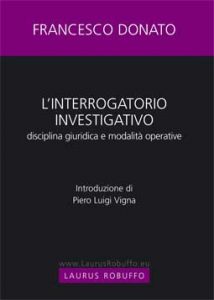Product Description
If on the one hand, technological progress continually puts at the disposal of investigators methodologies and tools that allow you to perform investigations ever more quickly and effectively, objectively valid results and incontrovertible, emphasizing too often the scientific investigation and, on the other hand, has pointed out that a judicial inquiry cannot prescind from the acquisition of information and news, which does not derive directly from the material elements of the crime scenebut are, instead, in the context of that classic investigation activity with operational tools of the so-called “traditional” type. Among these are a particularly important information that are derived from the evidence, from the interrogation of the suspect or accused and the victim of the offence itself survived the event. But how should we carry out an interrogation? What rules regulate? There are strategies and methods for obtaining accurate information or to help the victim to evoke the trauma suffered or to obtain admissions and confessions from suspects? These are some questions to which this volume attempts to provide an answer, illustrating both the theoretical and practical knowledge, views both from a legal perspective, the pragmatics, acquired from the author’s experience in the specific sector. Volume pages offer the rational reader behavioral methods, operational techniques and practical solutions, the knowledge of which it considers useful and necessary not only for investigative business operators, but also to the entire forensic class and for anyone wishing to embark on the path of investigation.



